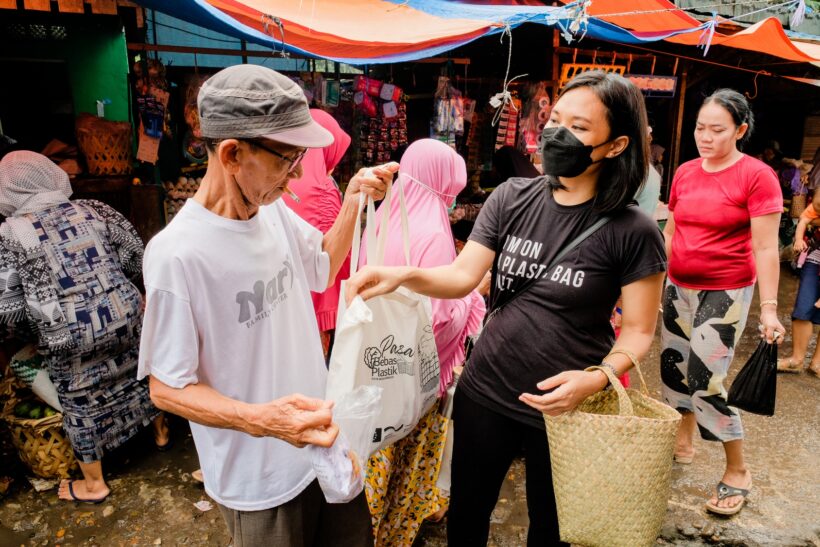Tiza Mafira: Fighting Abuses to the Environment One Logical Step at a Time
by Marco Sumayao

Tiza Mafira is used to adversity.
For more than 10 years, she’s fought to create a more sustainable Indonesia and has seen many setbacks along the way. Her work as the Executive Director of Gerakan Indonesia Diet Kantong Plastic (GIDKP or Plastic Bag Diet Movement) has resulted in bans on plastic bags across 76 cities, despite the significant number of challenges the movement had to face. And for her efforts, she was proclaimed one of the UN’s World Ocean Heroes in 2018, a recognition of the work she’s done in preserving our oceans.
What’s remarkable about all of this is that Tiza never planned to be an environmental advocate. “I think that what played a bigger role is how my family shaped me to be a logical person,” she shared.
From an early age, Tiza had always felt that damaging the environment was an illogical act. Given how dependent we are on the planet’s well-being for our survival, any sort of harm inflicted by us was just counterintuitive to her.
“It started from small things, like if I’d see my friends throw trash onto the ground. And then to the big things, like when I traveled to Kalimantan, in Borneo. I’d heard of Kalimantan; that’s where all the rainforests are. So I was really excited to see what a jungle looks like in person. But when I got there, we drove to the city and we passed all these hills that were barren. The trees were chopped off. There was a hill that was only half of a hill because it had been mined for the rocks and the minerals,” she recounted.
“It didn’t make sense to me,” she said. “Why would you destroy such a beautiful mountain? With all the plastic waste issues that we’re dealing with, the climate crisis, it’s just illogical for our survival. It’s illogical, as an intelligent human species, that we’re doing this to ourselves.”
Tiza would eventually attend law school and, given her passion for the environment, specialized in corporate law, climate change, and carbon trading when she pursued her master’s degree at Harvard. At the time, however, she felt that environmentalism would just be a hobby.
“I didn’t really think that being an environmentalist would be a profession, or could be a profession,” she shared, “So I started out doing various jobs… whilst keeping my eyes peeled on the environmental issues and looking for ways to channel the interest.”
Tiza shared that while she was happy and content, she started thinking that it was a waste to not apply her specialization. Unfortunately, the clients that would come her way were those who needed help skirting environmental regulations. They would ask her what the bare minimum for compliance was, and if there were any loopholes they could exploit to make it easier.
At one point, Tiza found herself facilitating the sale of lush rice fields to a client who wanted to pave them down in order to build a cement factory. It was then that she began to question her career, and if she could be doing more for the environment. She began to look for environmental causes she could champion. She decided to focus on plastic bag regulations after seeing that there was little to no action in support of this advocacy at that time.
In 2010, she founded the Plastic Bag Diet Movement together with like-minded individuals, which started a long-running conversation on single-use plastics in Indonesia. The group began lobbying for retailers to start charging their customers for plastic bags, believing that the additional cost would incentivize people to bring and use their own reusable bags instead.
While the retailers were open to the idea, they pointed out that implementing such a policy would send their customers to their competitors who don’t charge for the plastic bags. But if it became a policy that every store needed to comply with, they would be more inclined to do so.
Tiza’s team thus launched a successful petition for establishments to charge for single-use plastic bags, and in 2013, to the Ministry of Environment. After three more years of lobbying, the Ministry agreed to hold an unprecedented three-month trial run for plastic charges across 27 Indonesian cities.
After the trial run, the Plastic Bag Diet Movement conducted surveys which found that there was a 55% reduction in plastic bag use in participating cities—a figure that was crucial in confirming the campaign’s success.
“We told the ministry that this narrative has to come out,” Tiza said. ”There is a quantifiable reduction, and there is support from the retailers and the consumers. That came out, and the media capture was amazing. Yesterday, nobody was talking about plastic. The next day, every single media outlet was talking about plastic bags. It was crazy.”
As encouraging as the media frenzy was, however, the campaign fell short of spurring the Ministry into action. The Movement was able to get new policies drafted based on the results from the trial period, but they never got signed. They’d continue to lobby for the draft over the course of four years, to no avail.
“That was also like a huge lesson for me,” Tiza shared. “It’s not just about having everything in place, drafts in place, science in place. There’s also politics behind it that you may not be able to control.”
With the lack of action setting their campaign back for a few years, the group decided to pivot. If the State Ministry wouldn’t help them, they would appeal directly to the city governments themselves.
As luck would have it, a city in Kalimantan—where Tiza had seen drastic environmental destruction all those years ago—would give them just what they needed to get the ball rolling.
Banjarmasin City had participated in the plastic charge trial and was so pleased with the results that they told the Plastic Bag Diet Movement that they decided to craft their own legislation to reduce plastic bag use. Instead of just charging customers for using plastic bags, Banjarmasin officials decided to outright ban them.
This set off a snowball effect. With the Plastic Bag Diet Movement’s and the Ministry of Environment’s help, the city was able to organize a symposium on the plastic bag ban, inviting representatives from nearly 30 cities to learn more about Banjarmasin’s policies. Other cities saw how the bans weren’t just feasible; they were beneficial and, more importantly, replicable.
“The next year, there was another city [banning plastic bags],” Tiza recalled. “In 2018, there were five cities. In 2019, there were 13. It just kept rolling and rolling.”
Once Bali and Jakarta announced that they, too, were banning plastic bags, the movement exploded across Indonesia, with roughly 40 new cities making their own regulations within the next couple of years.
Not all sectors shared the cities’ enthusiasm, however. There was significant pushback from the plastics industry, the recycling industry, and waste pickers’ interest groups. Tiza found herself invited to Parliament for a dialogue with these sectors, and they decided to make a show of force.
“I hadn’t anticipated that the industry interest groups would invite themselves. They had invited like 10 other people; their names were not in the invitation,” Tiza shared. “I came into the room and it was just me, and I was seven months pregnant at the time. Just me, a heavily pregnant lady, and about 10 to 12 guys who were all against plastic bag bans.”
The groups argued that plastic bag bans would have a negative impact on the economy. The plastic manufacturers said they’d have to lay workers off, the recycling industry representatives said they’d lose their feedstock, and the waste picker groups said they’d lose their jobs.
In her counterpoint, Tiza showed how the bans could actually be beneficial to their respective industries: “What I said was, basically, ‘I’m trying to prevent some waste from being produced, so that waste management can become more effective. We’re basically taking the low-value plastics out of the chain, so that you guys can focus on the high-value plastics, and the recyclables.‘”
The groups would respond by disparaging her, saying that she didn’t understand how the world worked. They told her that her efforts were unnecessary, since everything could be recycled, anyway.
“I said, ‘if you can recycle everything, that’s amazing,’” Tiza shared. “‘Why don’t you focus on the waste that’s in the landfill … on the waste that’s in the sea and the rivers? Focus on collecting those, focus on recycling those, that would be amazing. I will focus on closing your tap. We can all work in tandem. We can have a great collaboration.’ And that basically concluded the conversation. Ultimately the parliament did not pursue any resistance to plastic bag bans. So I think we won that one.”
But these victories are only the beginning, in Tiza’s view. The Plastic Bag Diet Movement has recently launched its “Reuse in Jakarta” program, which aims to promote the reusing of goods rather than disposal. It’s a means towards their organization’s end goal of pushing for a more circular economy in Indonesia.
“We want reuse to become embedded within the economic system and the supply chain. We’re starting out small, but actually, the vision is much bigger, much more comprehensive. It should be completely standardized. It should be as natural as just going to a supermarket, buying stuff, and disposing of your stuff just as before, except that none of that stuff sacrifices the natural environment,” Tiza said.
She added: “So when everything is reusable, regenerative, recyclable—that’s when I’ll say my work is done. It’s a big vision, though! But I don’t mind the big vision. You have to because the big vision is what makes sense.”
For Tiza, she realizes that big vision is bound to be fraught with new challenges. Beyond the work involved in educating people about a circular economy, she’ll have to deal with the same government bureaucracy that made plastic bans a decade-long effort. She’ll also have to face pushback from players whose business interests conflict with sustainability.
It’s a whole new set of adversities she’ll have to deal with, but Tiza can’t imagine spending her life any other way, even if it isn’t exactly the kind of life she’d thought she’d lead when she was younger.
“I can’t fathom not trying to save the planet. Nobody said that it would be easy, but it would be worth it. That’s what I always have in mind,” she said. “‘Worth it’ doesn’t necessarily mean we’ll ultimately succeed. I have my doubts sometimes. But it means that I can be at peace with myself knowing that I tried as hard as I did.”










